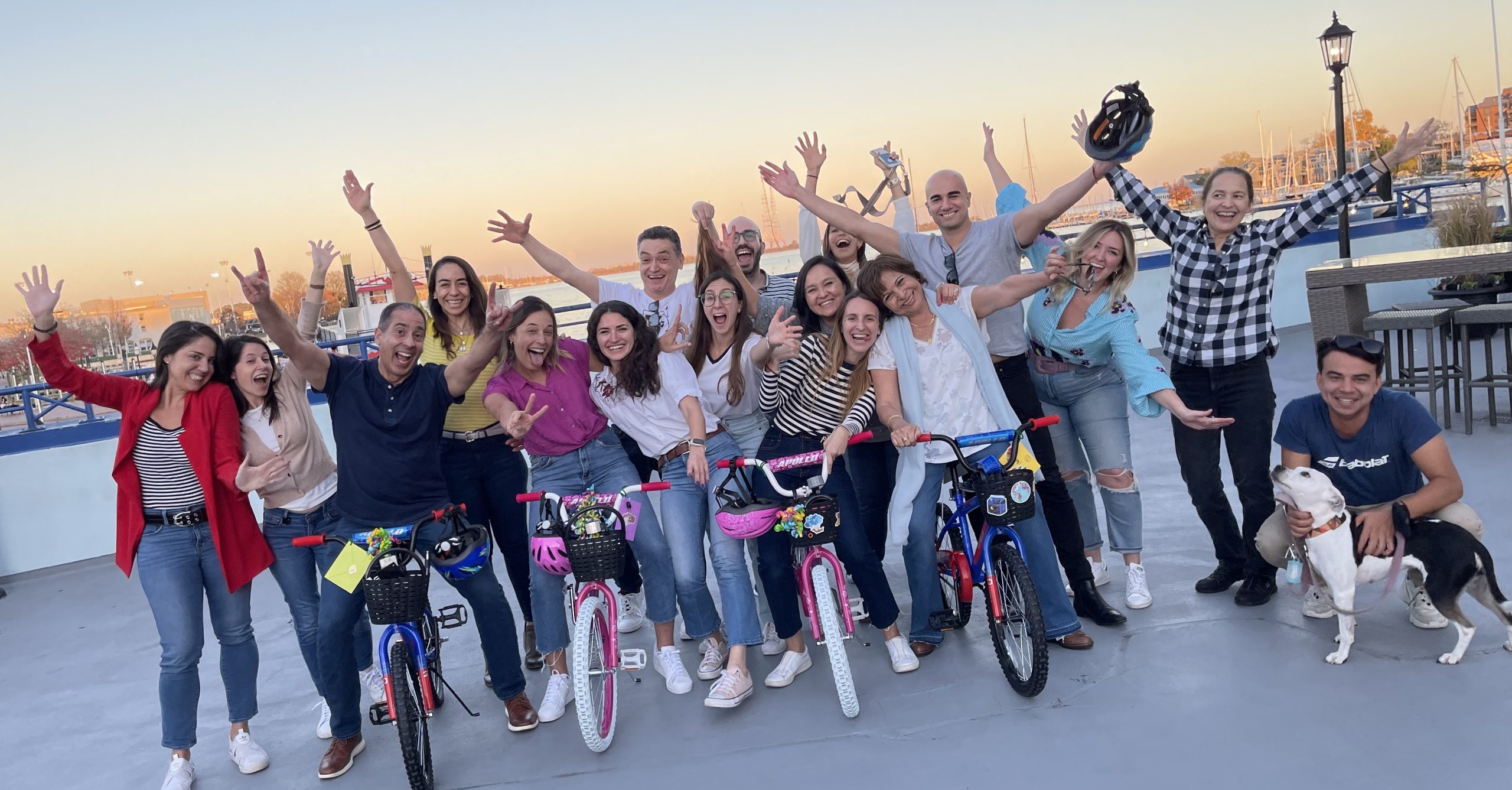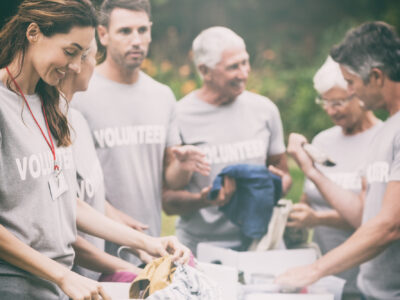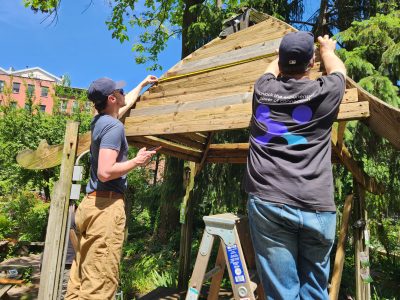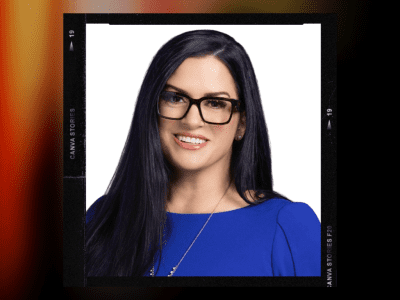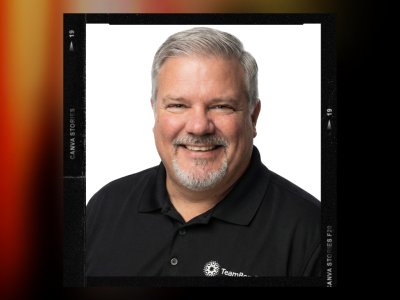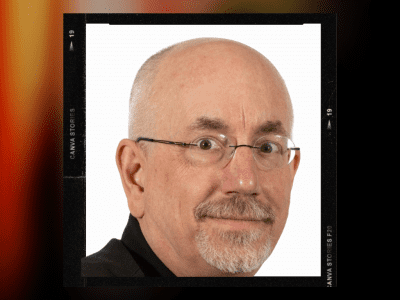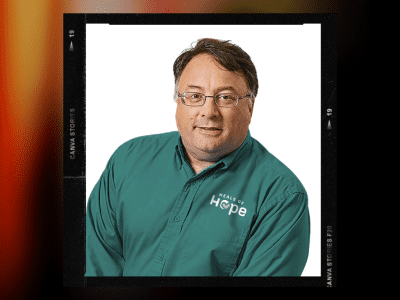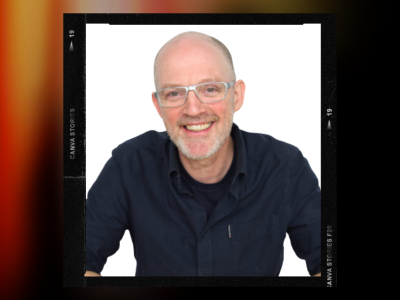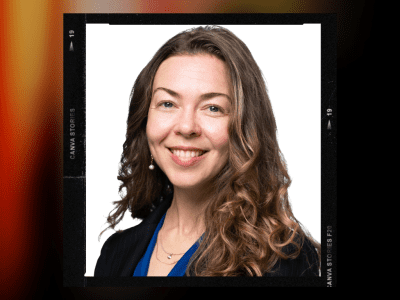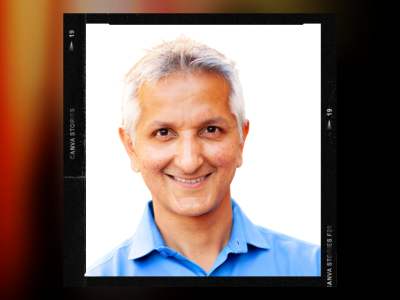STRONG TEAMS DON’T HAPPEN BY CHANCE 
The Mentor’s Playbook
w/ Angela Lewis
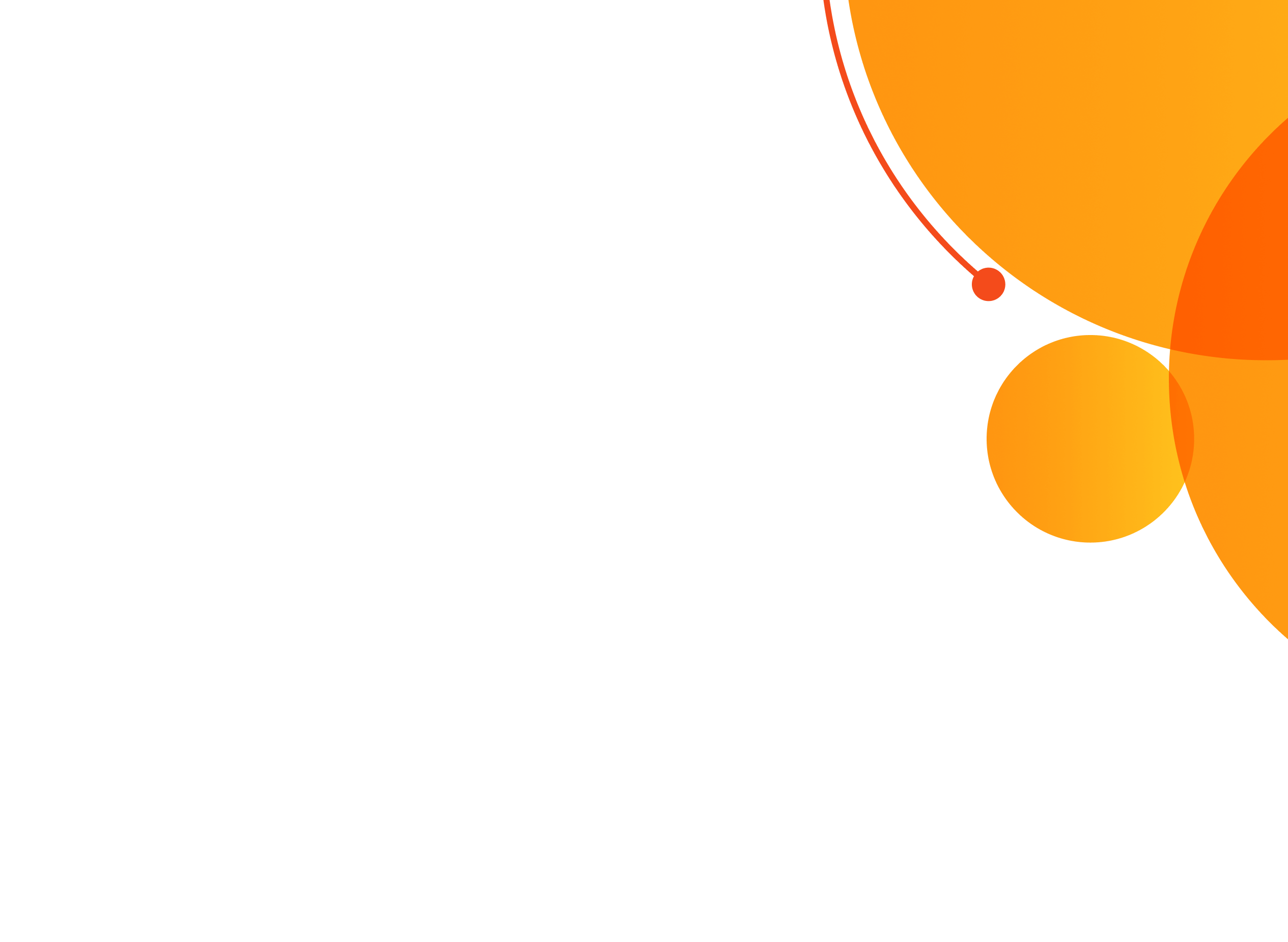
Use the buttons above to listen now.
Transcript - The Mentor’s Playbook
Rich Rininsland: Angela Lewis, thank you so much for coming on the show. Angela, it’s great to have you here.
Angela Lewis: Rich, thank you so much for inviting me. I’m so excited.
Rich Rininsland: So I was very excited to meet you. I enjoyed my team. My production team always puts together a nice package for me of the people who are gonna be coming on and who they are and where they come from.
And yours was a fantastic read. So I want my team out there to get to know you in that same way. So tell them, you were a championship athlete? And go on from there.
Angela Lewis: Okay. Well, before I was a championship athlete, I was six foot one at 12 years old. I have not grown since I was 12.
Rich Rininsland: Okay. I was about to say, how tall are you now?
Angela Lewis: Yes. I’m still, I’ve been this height for 30 years, which is much cooler at 42 than it was at 12. However, being that tall, I was really blessed to have someone, my first basketball coach see me and ask if I played basketball. And what I didn’t know is that Coach would be really hard on me, I would be playing on an all girls team, which was kind of rare back then. But they were competitive and they were winners, Rich. And so I was very bad because I hadn’t played before, but that led me to ultimately getting a Division one scholarship and playing professionally in Europe and then coaching college basketball.
It really fueled my desire to help others and really continue to build community around sport, but then also use sport to open doors for life. And so I work as Head of Operations at SpeakerHUB now, and I help lead our team, which I love.
Rich Rininsland: Excellent. So how do you think that that part of it, of course, being a part of a team and having, you know, someone training you, but others that you’re working with, how did it lead you to where you are today?
Like what, what was it about it that led you on this path?
Angela Lewis: Yes. Being on my, on the first team, the first basketball team, it did three things for me. One, it made me feel comfortable around other people because I wasn’t the only tall person. You know, sometimes we feel out of place. And being on a team can provide that safety net of community and identity.
The second thing that that experience did, that led to where I am today, is Rich, we traveled. I’m from the inner city of St. Louis. We went two places. My family went two places growing up. Memphis, Tennessee and Mound Bayou, Mississippi, the only two places we traveled. And my first basketball tournament was in Oklahoma City, Oklahoma.
And I saw people from other places for the first time other than Tennessee and Mississippi. So it opened up the world. And the third thing it did is it gave me understanding of you can work really hard and get better at something with other people. We know in life you, you’re not, no one wakes up great at everything. So it’s really empowering to know that you can start off incompetent and unskilled, but then become a professional.
Rich Rininsland: Excellent. And now you’re working with other professionals, with SpeakerHUB. What is it you do with ’em? What is it you’re teaching these people?
Angela Lewis: So SpeakerHUB, a little bit of context. SpeakerHUB helps leaders and business owners and professionals use their voice for good and get on more platforms to share their messages and grow their businesses. And so I lead our team and we have about 30 dynamic, young adults from all over the world. Venezuela, Colombia, Buenos Aires, Belgium, and I get to work with them to help them grow professionally, but help move our initiatives forward.
As a company, we help, you know, our clients, but my work internally is what I really, really love.
Rich Rininsland: So when you say you bring these people you help these people to help others, what kind of help do you think you’re trying to teach them? Or you’re trying to lead them to.
Angela Lewis: In terms of the customers that we work with?
Rich Rininsland: Yeah.
Angela Lewis: Oh, , to create and to have platforms to speak on. So we have a database of podcasts, conferences, associations, media outlets. Right. It’s how, it’s how I got here today, right. I just reached out. So we provide opportunities for them to reach out to people who are in alignment with what they care about and to share their expertise and what they’re really passionate about.
Rich Rininsland: Now, is it about helping them find just their audience or, you know, is it about helping them find that way to communicate with that audience?
Angela Lewis: Great, great, great question. It’s helping them find the audience. And we believe that your audience will tell you how to communicate with them, okay? You talk to enough people, they’ll, you’ll be able to tell by the look on their faces, by the questions they ask, what they need to hear.
And if you really care, you’ll adjust accordingly.
Rich Rininsland: Hmm. Let’s go back for a second if you don’t mind ’cause I’m fascinated with your time as a basketball player and a coach. Okay. Can you give me an example of, of something in that time period, like some shift of a dynamic or something that happened with you personally that actually sort of started the journey that kind of encapsulated where you wanted to go.
Angela Lewis: Defining Moment, Rich.
Rich Rininsland: Yeah.
Angela Lewis: After that time in Oklahoma? Yeah, at that basketball tournament. I went back home and received my first college recruiting letter, and that was to the University of Memphis. And I was going into the eighth grade and I was like, oh my God, I haven’t even been into high school yet.
It was a whole questionnaire about who I am and you know, my grades, but that moment of… I realized, oh, maybe I could actually play at the next level, and I started working much, much, much harder.
Rich Rininsland: Hmm. Do you find that there are people who are doing that with you now? The people that you are training, that they’re getting those moments to where I thought this would just be a fun little thing that I might do, but now this is something I can really strive for.
Now I have a direction and a goal.
Angela Lewis: Yes. Yes. One of our… our head designer named Maria, Maria’s from Venezuela. Maria’s an amazing designer and when she came onto the team, we were really small. There were maybe five or six of us. And the company kept growing and so Maria needed to add teammates.
Ah, so Maria had to hire another designer and someone else to help with our user interface and Maria was really nervous about leading because she was used to being the one doing the work. And so through some coaching and sharing some experiences, Maria has just blossomed into a dynamic leader who communicates effectively and directly.
And so I’m super proud of her.
Rich Rininsland: So what’s the key though? How do you get somebody from that, “I can do this all on my own, but I, but it’d be so much easier and better if I had other people with me.”
Angela Lewis: Well, there’s not enough time in the day, one. There weren’t enough hours for her to do everything okay, and she needed help.
And the truth is there are people who were better at different things. So now our designer Angel. He was more technical design. He can create more, better technical designs than Maria. Maria is great, but he had a different skillset. And then Haiti is an organization wizard and she really helps us figure out the flow, the customer experience in the flow of using the platform.
In ways that we couldn’t have even imagined. And so to answer your question a bit more directly, realize that you can’t do it all. And there are people better than you, and every leader hires people better than them to get things done.
Rich Rininsland: Then what’s the leader for?
Angela Lewis: To ensure that, you know, we’re all going the same direction.
Rich Rininsland: There you go. That’s what, because part of what I like to do is to actually think, what might my audience be asking my team out there be asking right now? And every time I’m doing these shows, everybody’s talking about how, you know, you have all these wonderful dynamic people that you are the head of.
And it’s like, yeah, what do the leaders do? What, what are they doing? What are they doing? But that’s what we need to remember. We need to remember that you still do have a point in all this leaders out there.
Angela Lewis: They’re the ones staying up all night making sure—
Rich Rininsland: Exactly. Yes, yes, yes. Let’s make sure everything is still flowing in the right direction.
Fantastic. So let’s talk about the philosophy though, of team dynamics. Like what is it that… You have a, in your basketball career you have a captain, right? Yes. You have your forwards, you have your guards, you have everybody doing their own thing. What brings them together? What should be the thing that everybody needs to remember to keep the team flowing as the team?
Angela Lewis: There are a couple of things that I think are big. One, an aligned mission and vision, like we’re trying to win or we’re trying to win a championship, right? We’re trying to improve our field goal percentage. There has to be a goal that we’re all seeking. That’s part one. Part two is that as an individual, we all actually want to get better individually because we understand that if we improve, then the whole team improves.
And then the last part is trust. You can all want to win. You can all choose to decide you wanna be better, but if you don’t trust each other, you’re never gonna get to the goal and, and the team will break apart. Which we see happen all the time.
Rich Rininsland: Well, what do you do when it happens? I mean, first off, how can I recognize of my team is starting to splinter before they fall, and then how can we, how can we repair it?
Angela Lewis: For basketball? If we’re talking sport. If you’re losing, losing really does a number on the trust. You know, it’s just harder because people start pointing fingers and people believe they all have different solutions to solve the the losing issue. So basketball becomes really easy. I haven’t seen a team that loses a lot where everyone trusts and loves each other.
That’s just, I haven’t seen it. So there’s that part. How do you bring it together? One, solving one problem at a time. So oftentimes when things aren’t going well, whether it’s in the business setting or in basketball, we try to solve everything. So we’re gonna increase our field goal percentage.
We’re going to increase our rebounds, we’re gonna do all these different things, but you can’t do ’em all at the same time, right? So pick one thing, get better at it, pick another thing, get better at it. So slowly over time, you can repair you can repair the output. That oftentimes repair some of the trust.
Rich Rininsland: Mm. Besides losing, are there any of the things that we can look for in, like, say a corporate setting where we can as, as a warning sign that things are starting to slip? I mean, how many times on your team have like the individual players fall into infighting or blame throwing?
Angela Lewis: All of that. All of that. All of those. Blaming infighting. Lack of responsiveness. Lack of communication.
Rich Rininsland: Okay.
Angela Lewis: I think those things are really big. And of course the lack of quality of work. If there’s a quality issue and it’s been addressed and it there continues to be an issue, then, then there’s something there that that’s missing.
And you also may have, we’ve seen situations where only two people are talking. Some people who just silenced themselves. They called it quiet quitting? I think that was like a thing. It’s not necessarily quitting, it’s just like indifference toward the cost.
Rich Rininsland: Okay. Okay. And so if we recognize it and we see it, what do you think is the best way for that leader? For the, the owner, the manager, whoever it happens to be, to bring it to the fore. If that’s the one, the first thing they want to fix?
Angela Lewis: First, self assess. Everything, rises and falls with leadership.
Like at the end of the day, it’s your fault. Regardless of what we may think, regardless of someone else making decisions to do things, we still have the ultimate responsibility to ensure that things go well. Either you need a new teammate, either they need to be coached more, but you have to find a solution to help.
So first I would say acknowledge the issue and then assess what you’ve done or not done, and helping or creating this dynamic, because leaders always play a role in the dynamic. That’s what you sign up for. And then after from there, i’m a big proponent of a conversation.
Have a conversation about what’s happening. Not the person, but it’s the the task that’s not being addressed or the issue. Talk about the issue, not the individuals. And the last part is try to come up with a solution that is quantifiable. So, I’ll give an example. There’s a young woman that I know that I mentor.
And she said, my boss came to me and said that I was arrogant. Well, but how does that impact your work? Like, how do, and that’s kind of like a stick it at who she is as a person, right? Does that mean that she, you’re not getting things done? Are you not open to feedback? You know, there’s a way that you can communicate that says, here’s the issue, but we can still get better from it.
Rich Rininsland: Yeah. And, and that’s certainly not like maintaining that emotional safety that so many people talk about. Is there some way, like what would you recommend for, for that manager who did the, well, it’s your arrogance that that’s making you fall by the wayside. How would you sort of stop them mid sentence and say, maybe try it like this?
Angela Lewis: I would say focus on… What way is she not producing or what? What does that, even if I’m imagine, I see that someone has an aura of arrogance. I would say, or what I, and it’s my perception, right? I may look at it, and it may not be arrogant, but for him, he may see arrogance. That’s a very personal description of someone.
So I would say, of course, check yourself. What were the goals? What was the plan? And is she following the plan? If she’s following the plan and she’s producing, then the way she does it, even if you don’t like her personality, that has nothing to do with the work. That’s what’s, you know, that’s your issue, not hers.
But if she’s actually producing and is doing what she says she was gonna do, then let her be. But if not, then correct that part. Give her some coaching and guidance on the other part.
Rich Rininsland: I mean, if you’re calling somebody arrogant, there’s a little bit of arrogance in yourself to think you can get away with calling them arrogant.
Arrogance exists. Arrogance can oftentimes lead… you can find a good leader from that person who is self-assured and you know, yes, some might think arrogant. But that’s a very American way of looking at things and the one thing I loved about doing this podcast, especially in the very beginning, was we made a clear and present choice to talk to people from across the globe.
Now, when I did this, it was in the middle of a pandemic, so those people I was talking to, we had kind one topic to talk about throughout the entirety. But you’ve also traveled. You traveled. Where have you actually worked and lived?
Angela Lewis: I’ve lived in Germany and Medellín, Colombia. And our team now is all over.
We’re 100% remote company and we have teammates all over. And I love it. Absolutely love it.
Rich Rininsland: I can imagine. I mean, that’s ama I miss talking to the people that I used to talk to, I’ll be honest with you.
Angela Lewis: Thinking about reaching back out to them?
Rich Rininsland: A bit just to see how things are now, especially, but there were some people, and these were all other team building companies across the globe who are partnered with us here at TeamBonding and it’s so good to hear how other people view the same process that we’re all, that we’re all trying to go through.
Angela Lewis: Yes. I really think everyone should leave and go live somewhere else for a year if you can. I know the world is different. Different people have rules about where you can enter and can and… I think there’s so much value. You learn so much.
Rich Rininsland: So what have you learned? I mean, what going along this same process, the same philosophy of, you know, safe leadership and team dynamics. What did you see that from out there that you wanted to bring here or that you thought would really assist people here?
Angela Lewis: Relax. Just relax. You know, living in other place. Rich, you know how intense we can get. Just relax. Living in Columbia was the most relaxing, but people still worked, but their view on life… I saw people who, there were some people who didn’t have a lot, who were so happy. And there’s so much that we take for granted.
I’ll give you another example. Current example. I was having a one-on-one call with someone on our team who lives in Venezuela.
Rich Rininsland: Okay?
Angela Lewis: And the city he’s in, the gas was out for a month. Oh, they could not cook food on the stove. Can you imagine? We have another person on the team… She would be on the call and then it, it would just go out.
Her internet would go off, or there’d be a power outage. And so the, the things that we get upset about, like the wifi not connecting quickly enough. Or you know, all the little things that are seemingly massive inconveniences in our life. What I learned is just relax because it’s not that big of a deal.
.
Angela Lewis: There’s someone else who would trade spaces with you. So just be grateful and relax, but then also connect with other people to learn from. I have so many stories about, like things that I’ve learned, but those are the things that really hit home for me.
Rich Rininsland: So gimme one of those stories. I mean, you don’t have to name names by any stretch of the imagination, but gimme something of that personally taught you at that time.
Angela Lewis: Venezuela was going through, has consistently gone through a pretty difficult time. And during the election cycle, there were power outages everywhere. And, and we could feel the angst within some members of our team because of what was happening in their country. And so we told everybody on our team, if you need a generator, let us know. We’ll give you money. We’ll send you money so you can go out and get generators. Because you never knew when the power would come on.
It was like, get a generator that can support your family or that supports… you know that’s big enough for you to be able to have, and then you’ll have it long term. And so that’s something that I can’t really imagine in the sitting where I’m sitting, but you learn a level of empathy and to ask more questions than what’s on the surface.
We see what’s happening. Then we have the one-on-ones you can sense. You can sense and feel that, oh, there’s some distress among the team, and how can we help?
Rich Rininsland: That’s fantastic ’cause everything that I have ever learned in this podcast always seems to come back to the same thing. That sense of empathy. That sense of thinking of the other before you think of yourself.
How can we teach it though, Angela? That seems to be and unattainable goal, especially in an American made market, where you think back as early as the, the eighties to current day. Where those unempathic people are the ones who are making greater strides, they’re always getting up to the C-suite.
How can we flip the dynamic? How can we teach people that thinking of others is the way to start? It’s a tough question.
I’ve been doing this. I’ve been doing this six years. It’s a tough question.
Angela Lewis: I’ll say it starts in two places. Well, before the workplace, it doesn’t start in the workplace. Our level of, the level of empathy that I have and that our owner, Ron Story Junior has didn’t come from working at SpeakerHUB. It came from our families. It came from his mom being an educator and was always helping kids.
There was always kids at the house. It came from my mom and dad being willing to give kids rides after basketball games and when, we were the house that had the basketball hoop in our neighborhood. So all of the kids would come over and my mom would cook food for all the kids.
So I don’t think that empathy starts in the workplace. I think it starts in your home and in your community. And if we can teach people to be more empathetic there, it becomes a part of the core. Rich, I’m not a believer in, you can change people’s value systems in Corporate America because… you show up that way. So I don’t know. To answer your question, I don’t know, like help the kids learn ’cause if you can get ’em earlier, then they become adults with empathy. But I don’t know how to do it.
Rich Rininsland: Maybe some kind of award system? To sort of say that this is the better way? And to show everybody else that it’s a better…? I don’t know. I’m spit balling here with you now.
Angela Lewis: I don’t think we can mandate heart. I don’t think you can legislate heart and spirit. So I, I don’t know. I would say if you’re someone who needs empathy, so if, if you’re listening and you’re someone that prefers an empathetic culture, then find a culture whether leaders are empathetic.
And then move yourself because I just don’t believe we can change these massive systems that we here before and they’re designed to last long after us. And that may sound doom and gloom, but I just think we can control our environments as much as possible and the people we surround ourselves with to hopefully create a peaceful life.
Rich Rininsland: Okay. Okay. Speaking of awards though, you’ve won some yourself over the years. What do you got, the Robin Roberts Sports Communication Award! Congratulations. When was that? When did that come across your lap?
Angela Lewis: That was, oh my God, Rich. That was my senior year in college. And my coach told me about it.
It was given by the Women’s Basketball Coaches Association. So I could apply for it. And when I found out I won, I was like, Robin Roberts is the legend! I gotta meet Robin Roberts of the event at the luncheon. It was amazing. That was a really, really special award for me.
Rich Rininsland: Hmm. How did that change you? How did that, how did that impact you and reshape your life and you know, the legacy you wanna leave behind as being one of those? ’cause it’s a very select group who, who gets to have a celebration of themselves like that.
Angela Lewis: It really shows the power of sports and women in sports. Robin was a trailblazer. I mean, it created this sense of responsibility. I wanna be what Robin Roberts is for me and so many other young women. I want to be that for others. And so it created that. Thank you for that question. No one has ever asked me about that! You were so good.
Rich Rininsland: I said I loved reading about you. I’m telling you, you have a very rich life.
Okay. Favorite team building activities. What kind of things do you like to recommend to people that will, sort of help them to bring people closer together?
Angela Lewis: Is this in the corporate setting or in general or sports?
Rich Rininsland: Give me everything. I wanted all.
Angela Lewis: Everything. Okay. I will tell you the best thing that I did in college. I went home with one of my college teammates. She is from the small town in Indiana called New Washington, Indiana. I’m from the city of St. Louis, like… the CITY-city of St. Louis.
She’s from New Washington, Indiana. Completely different world. I went home with her for a weekend, which I have never seen a cornfield. I hadn’t stood in cornfield until I went to Indiana. I hadn’t rode on a riding lawnmower. I hadn’t seen a house that was on acres and acres of land.
I mean, her dad built the house. They had a pond in the back. You could fish in the… I grew up in the city of St. Louis. I didn’t see any of that. So me going home with Kirsti really helped me understand her better. I got to meet her family and see where she’s from. So I would say the first part of, if you wanna build teams, just step into someone else’s world.
Maybe it’s an activity that they enjoy, but find a way to connect. That’s more of one-on-one, but that could be done in a group setting. We took the whole team to our house when we played near there. So figure out how you can learn about them as a person. Other team building activities… I’m a big proponent of play.
Obviously as a basketball, I think play is a great way to connect people. So I mean, it’s, if there are—
Rich Rininsland: I don’t want to ring our own bell, but it is what TeamBonding is all about, that power of play. There’s nothing like throwing people together in either a sporting event or some sort of game to see who they truly are.
Angela Lewis: Yes. And then you let down your guard. when you’re able to play. So get to know your people, find out what games they enjoy and just play.
Rich Rininsland: So what advice do you have for any, you know, young athlete out there? Or any professionals that. You know, wanna rise up a little bit higher than they are now.
What advice can you give them? Especially if they’re feeling a little shaky on whether or not they think they can, they can become, you know, or that they can reach the heights that they wanna reach for themselves.
Angela Lewis: So the question is, what advice do I have for athletes or any professionals who want to accomplish their goals?
Like, get higher, right. Move closer toward their goals. The first step is to actually commit to the goal. We live in a time where distractions are everywhere and I’ve been guilty of it as well. I’ll say, oh, I’m going to do this thing. Oh, here’s another opportunity. Here’s another opportunity.
You know, and we can get caught in the, call it shiny object syndrome. So commit. Commit to the goal. The second thing is know that it will take time. Again, we live in a culture where we want everything so fast.
Rich Rininsland: Mm.
Angela Lewis: But things don’t always happen in a timeline that we want them to happen. But they can happen if you continue to pursue it because you don’t know what obstacles.
So you don’t know what obstacles are gonna come and knock you off your game. Because they will come. That is for sure. Commit to the goal, make sure that you stay focused. And then the third thing that I think is underrated is ask for help. People who are really driven and committed have a tendency to think they can do everything themselves, like I mentioned about Maria.
But you can’t. You don’t know everything. Yeah, it’s not possible to know everything. So ask for help when you need it. Google first, use ChatGPT. Find out as much as you can. But if you get to a road block where you’ve done all that you can do, ask for help and be patient.
Rich Rininsland: Not everybody can throw the rock. Sometimes you have to pass.
Angela Lewis: Yes, yes, yes. Okay, Basketball analogies! Yes, a hundred percent! I like that.
Rich Rininsland: That goes to all of my friends out there who actually know me and know I am not a sports guy. That’s the best metaphor I could come up with at the time.
Speaking, which, if you can for me, just sum up for us your mission statement. Like what is it you want for those people who… they’re listening to you and they’re thinking maybe they want to, you know, they want to go to SpeakerHUB to learn more for themselves. So sum up for them what it is you want to bring to them and to yourself.
Angela Lewis: What I want to bring is the recognition that you can learn, grow, and give. Like if you really can wrap your head around those three concepts that you’re always learning, which creates growth. So you’re always growing and you’re always giving, you’re gonna have a very rich life. rich meaning, you know, hanging out with Rich, but… in terms of your sense of self, your level of confidence, and knowing that you’re pursuing things that are meaningful for you. So, learn, grow, and give. That’s what we do at SpeakerHUB. We encourage everyone to continue learning. Of course , you’re growing, but then you’re giving your voice and you’re lending your voice to impact the lives of other people.
And so that’s my mission, to keep learning, growing, and giving, and help other people do the same.
Rich Rininsland: I think that’s a perfect way to wrap right there. Angela, thank you so much. Did you have fun,
Angela Lewis: Rich? So much fun. This fantastic. This was a blast, Rich. I really enjoyed talking to you.
Rich Rininsland: Thank you. I’ve enjoyed this as well. I hope you continue to feel that way. ‘Cause it’s time for my speed round.
Alright Angela, so you’ve heard the show, you know what, what’s gonna happen? There’s gonna be 60 seconds of music where I’m gonna be asking you a series of completely silly and innocuous questions. Your objective is just to answers quickly and honestly as you feel if you are feeling at all competitive.
We are at 17 questions asked within 60 seconds.
Angela Lewis: Let’s go.
Rich Rininsland: So let’s see if we can do it.
Angela Lewis: Alright, I’m ready.
Rich Rininsland: As soon as you hear the music, I am gonna ask the first question if you’re ready. Angela. Oh, away we go. What’s your name?
Angela Lewis: Angie.
Rich Rininsland: How many kids you have?
Angela Lewis: None.
Rich Rininsland: How many pets?
Angela Lewis: None.
Rich Rininsland: What job would you be terrible at?
Angela Lewis: Oh God. Diving.
Rich Rininsland: Favorite way to unwind after a stressful day.
Angela Lewis: Salsa dancing.
Rich Rininsland: What would you like your last meal to be?
Angela Lewis: Pizza.
Rich Rininsland: Pancakes or waffles?
Angela Lewis: Pancakes.
Rich Rininsland: Favorite guilty pleasure TV show?
Angela Lewis: None.
Rich Rininsland: If you could be any fictional character, who would you be?
Angela Lewis: Superwoman.
Rich Rininsland: What is the most adventurous thing you’ve ever eaten?
Angela Lewis: Arepas con Huevos.
Rich Rininsland: Name a time when you laughed really hard.
Angela Lewis: Talking to my brother yesterday.
Rich Rininsland: What’s the most important lesson you’ve ever learned?
Angela Lewis: Relax.
Rich Rininsland: If you could work remotely from anywhere in the world, where would you choose?
Angela Lewis: Columbia? No, Portugal.
Rich Rininsland: 14!
Angela Lewis: Keep walking around the world. No, Italy.
Rich Rininsland: I like it. I like it. You know what, hopping is fine. We’ll just take the globe trotting to the next level. 14, my friend. Well done.
Angela Lewis: Thanks.
That is, that is not 17, but it is far better than average. So well done to you. Angela, real quick, lemme just ask if there is any way that my friends out there can learn more about you, where would they go?
You can find me on LinkedIn, Angela R. Lewis or angelarlewis.com and or SpeakerHUB.com. Learn more about SpeakerHUB as well.
Rich Rininsland: There you go.
Angela Lewis: So either one.
Rich Rininsland: Thank you very much, Angela.
Angela Lewis: Thank you.
June 3, 2025
In this inspiring episode, former pro basketball player turned global team leader Angela Lewis shares how her time on the court led to big wins in the workplace—especially when it comes to mentoring employees. From barely making her middle school team to playing professionally in Europe, Angela’s journey is full of lessons on grit, growth, and the importance of mentorship.
Now at the helm of a 30-person international team at Speaker Hub, Angela breaks down why mentoring in the workplace isn’t just a nice-to-have—it’s a game-changer. She chats about how mentoring and coaching in the workplace help teams build trust, communicate better, and actually enjoy working together (imagine that!).
So, why is mentoring important in the workplace? Angela puts it simply: it helps people feel seen, supported, and empowered to succeed. Whether you’re leading a team or just starting your career, this episode serves up practical advice with a side of heart.
About Angela Lewis:
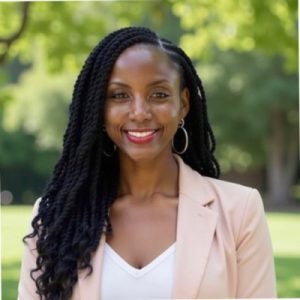 Angela Lewis is a former elite basketball player, championship-winning coach, author, and global speaker. After founding a successful PR agency (later acquired by SpeakerHub), she became Head of Operations, supporting 60,000+ speakers worldwide.
Angela Lewis is a former elite basketball player, championship-winning coach, author, and global speaker. After founding a successful PR agency (later acquired by SpeakerHub), she became Head of Operations, supporting 60,000+ speakers worldwide.
Today, Angela helps elite athletes step into leadership, build their brands, and speak with confidence, clarity, and purpose. She’s spoken at Florida State University, Nike Elite 100, and the Platform Speakers Summit, and her work has earned honors including the Robin Roberts Sports Communication Award and US Bank Women of Distinction.
With experience living across Europe, South America, and the U.S., Angela brings a global perspective to every stage and conversation.
Realize that you can't do it all. There are people better than you, and every leader hires people better than them to get things done.
Angela Lewis
More great podcast episodes.
Season 7 | Episode 1
The L&D Approach That Actually Works
Season 6 | Episode 18
That’s a Wrap!
Season 6 | Episode 17
Work-Life Integration
Season 6 | Episode 16
Laughing it Off
Season 6 | Episode 15
Corporate Volunteerism in Action
Season 6 | Episode 14
Collaborative Play at Work
Season 6 | Episode 13
The Science of Supportive Workplaces
Season 6 | Episode 12
The Power of Being Present
